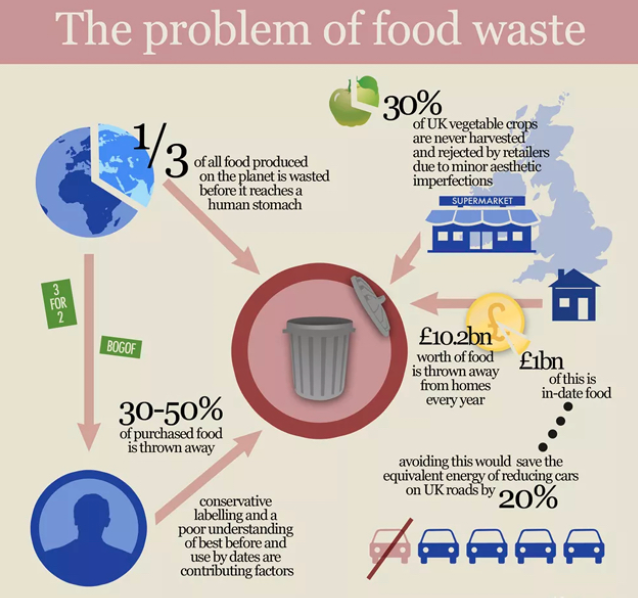Learn More About Reduction and Processing of Food Waste
Reducing food waste or realise value of surplus food is becoming easier with the emergence of new technologies. Approximately 20% of the UK's greenhouse gases are derived from waste food, as well causing harmful chemicals to enter the ground and contaminate soil. All food waste, raw and cooked, can be transferred into the Ridan composters, which naturally break down the content into compost that can be taken to local farms. When businesses or individuals sign up with Green Plate Limited, they will be able to realise value of their surplus food or finding best way of processing food waste.
Green Plate Limited aims to aid government drive for a cleaner Britain. By the end of 2019, the UK's ethical spending reached 98 billion pounds. We know that consumers are becoming more focused on making ethical choices and are more likely to be attracted to businesses that consciously strive to become more sustainable. From a business and customer perspective, we believe this model can be highly scalable, supporting new priorities for businesses and consumers and driving change.
High Level Analysis
The UK is in need of help when it comes to improving the amount of food that is wasted. 9.52 million tonnes of food is thrown away each year in the UK, releasing a total of 25 million tonnes of CO2 (results from a study by WRAP, Waste and Resources Action Programme, 2018). 75% of this waste is avoidable. Overall, food production accounts for 26% of global greenhouse gases, a statistic that underpins how important it is to reduce waste in this area. The UK government has pledged to reduce the country's food waste per capita by 50% by 2030, highlighting the drive of the nation to make sizeable changes. There has been a shift in the way businesses are thinking about food waste, and more focus on beneting communities by using local produce.

The Hospitality Industry
The hospitality industry produces around 1.1 million tonnes of food waste per year. The Food Waste Production Roadmap, an initiative made between WRAP and the Institute of Grocery Distribution, outlines numerous goals for households, manufacturers, restaurants, hotels and other venues in the hospitality industry to improve its relationship with food and reduce food waste. The initiative has attracted around 35 hospitality businesses, but is seeking more to join the journey. The creation of this initiative is a testament to the urgency of the food waste issue in the UK.
Efforts to reduce food waste
Businesses are starting to take this issue seriously, implementing strategies to reduce the amount of waste that is produced. For example, Wetherspoons has partnered with the organisation Fareshare, who describe themselves as 'the UK's national network of charitable food distributors'. Now all waste generated from Wetherspoons venue, is collected by FareShare, taken all across the country and redistributed to charities, school clubs and community groups. A second example for UK enacting change, is through The Real Junk Food Project, who like FareShare, redistribute food to charities and community organisations. Innovation has been sweeping across the sector, with ventures such as TOAST, who use surplus bread to brew to make beer, described as 'planet-saving craft beer'. Undoubtedly, there is a market for products/services that measure and reduce food waste across the UK. "Between April and June 2020, TRJFP intercepted 800 tons of surplus food, the equivalent of over 1.9 million meals. This food was used to deliver isolation packs to people’s homes during lockdown, and to support up to 250 third sector groups per week across the West Yorkshire region." Our impact - TRJFP

Anaerobic Digestion
As concerns for the rising amount of carbon emissions grow, businesses are seeking ways to not only reduce the amount of food waste they are producing, but to harness techniques to correctly dispose of the unavoidable food waste that is generated. The anaerobic digestion industry is growing considerably; valued at 7.54 billion in 2018, and forecast to grow to 15.28 billion by 2025, this industry has a CAGR of 10.62%. Government attempts to reduce greenhouse gases and divert waste from landfills, has seen the creation of initiatives such as Bio4tech, which converts food waste into biogas, and generates electricity which will go to local businesses or National Grid if there is surplus.
Responsible Sourcing
A key trend that is growing in the food and drink industry, is sourcing produce and ingredients locally. The antiquated idea that locally sourced produce would create a limited menu, is becoming a thing of the past, as businesses understand the value in purchasing local produce. Eateries up and down the country are beginning to shift their focus onto sourcing local produce for their menus. The Red Duck in London, is an example of this, prioritising high-quality but as local as possible produce. As of 2016, The National Restaurant Association reported that 57% adults are more interested in eating at venues that source their ingredients locally. Furthermore, the customer, as well as businesses, is driving this change and represents an opportunity for the industry to focus more on. Responsible and local sourcing gives businesses a chance to boost brand reputation, attract increasingly eco-conscious customers, support local economies and businesses, and reduce transport of produce. The benefits are very attractive.
A Global Issue
Food waste is not an issue unique to the UK. This is a global problem. The United Nations estimates that 1.3 billion tonnes of food is wasted globally each year- this accounts for one third of all food produced. With the global population estimated to reach 9.8 billion by 2050, 2.2 billion more than the current global population, the issue of food waste is becoming more pressing. Shockingly, 28% of the global land mass used to produce food, is put to waste each year. The UN has identified key areas that will aid the government against food waste; preserving food during transportation, converting waste food into alternative energies, distributing excess food and changing consumer behaviour through education. There are things that every person can do to reduce the amount of food waste entering the natural environment, and there is a clear trajectory to combat this monstrous issue.

